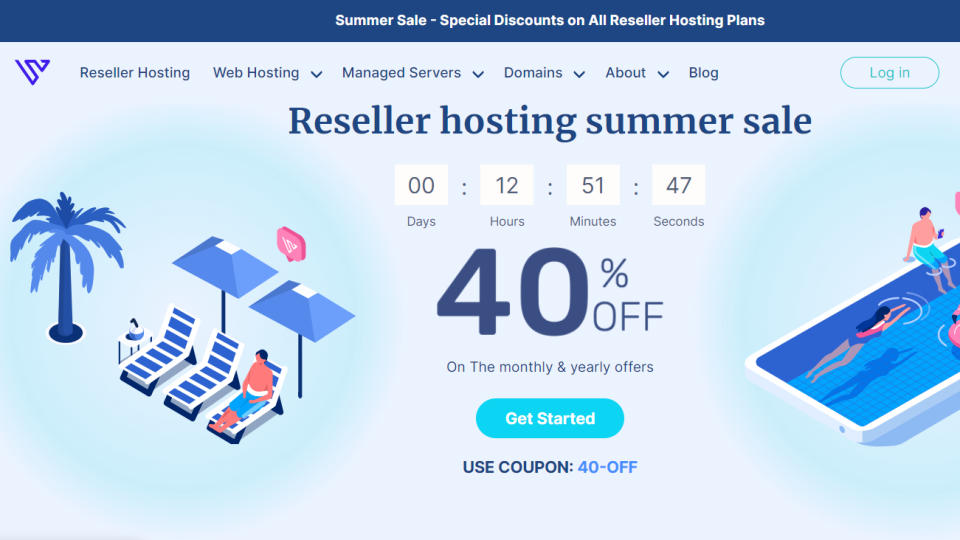
Reseller hosting is a type of web hosting where an individual or company buys web hosting resources from a hosting provider, and then resells them to clients as their hosting service. This type of hosting allows individuals and businesses to start their own web hosting companies without having to invest in expensive infrastructure or technical expertise.
In this article, we will explore what reseller hosting is, how it works, its advantages, and its drawbacks.
What is Reseller Hosting?
Reseller hosting is a type of web hosting service where a person or business buys a large web hosting plan from a hosting provider and then divides it into smaller hosting plans to sell to other individuals or businesses. The reseller acts as a middleman between the hosting provider and the end user.
In other words, reseller hosting allows an individual or company to start a web hosting business without investing in expensive infrastructure, such as servers and data centers. The reseller can purchase a large web hosting plan, and then divide it into smaller hosting plans, which can then be sold to their clients.
How Does Reseller Hosting Work?
The best reseller hosting works by a reseller purchasing a large web hosting plan from a hosting provider. This plan usually comes with a set amount of disk space, bandwidth, and other resources. The reseller then divides this plan into smaller hosting plans and sells them to clients.
The reseller is responsible for managing the accounts of their clients and providing technical support. However, the hosting provider is responsible for maintaining the servers, providing security, and ensuring uptime.
Steps to Start a Reseller Hosting Business
Step 1: Research and choose a reliable hosting provider
The first step to starting a reseller hosting business is to research and choose the reseller web hosting. You want to find a provider that offers quality hosting services, good customer support, and competitive pricing. You also want to make sure the provider offers reseller hosting plans that meet your needs and budget.
Some of the things to consider when choosing a hosting provider include server uptime, security, backup and recovery, scalability, and user interface. Look for reviews and ratings from other resellers and customers to get an idea of the provider’s reputation and reliability.
Step 2: Choose a reseller hosting plan
Once you have found a reliable hosting provider, the next step is to choose a reseller hosting plan. Reseller hosting packages come in different sizes and configurations, so you want to choose one that meets your needs and budget.
Consider factors such as the number of websites you want to host, the amount of disk space and bandwidth you need, and the level of technical support you require. You also want to look for features such as email hosting, control panel access, and one-click installation of popular web applications.
Step 3: Define your target market and pricing strategy
Before you start marketing your reseller hosting business, you need to define your target market and pricing strategy. Consider the types of clients you want to attract and the pricing model that works best for you.
You can choose to offer your reseller hosting services at a flat rate or on a tiered pricing model based on the number of websites or the number of resources used. You can also offer value-added services such as website design, SEO, and email marketing to differentiate yourself from other resellers.
Step 4: Build your brand and website
To attract clients and build your reseller hosting business, you need to build your brand and website. This includes creating a unique name and logo for your business, designing a professional-looking website, and creating compelling content that showcases your services.
Your website should include information about your reseller hosting plans, pricing, and features, as well as contact information and a support ticket system. You can also include a blog to share news and updates about your business and industry trends.
Step 5: Market your reseller hosting business
Once you have built your brand and website, the next step is to market your reseller hosting business. This includes promoting your services through social media, paid advertising, email marketing, and SEO.
You can also offer incentives such as discounts, referral programs, and free trials to attract new clients and retain existing ones. Make sure to monitor your marketing efforts and track your results to adjust your strategy as needed.
Step 6: Provide excellent customer support
To succeed as a top reseller hosting provider, you need to provide excellent customer support. This includes responding to client inquiries and issues promptly, offering technical support and troubleshooting, and maintaining a reliable and secure hosting environment.
You can also offer knowledge base articles, video tutorials, and webinars to help your clients learn more about your hosting services and how to use them effectively. Make sure to prioritize customer satisfaction and listen to their feedback to improve your services.
How to Choose the Best Reseller Hosting Plan for Your Business
Determine Your Needs
The first step in choosing a reseller hosting plan is to determine your needs. Consider factors such as the number of clients you have, the amount of storage and bandwidth required, and the level of technical support you need. You should also consider the types of websites your clients have, as this can impact the hosting resources required. By understanding your needs, you can narrow down the list of potential reseller hosting providers and plans.
Evaluate the Hosting Provider
When choosing a reseller hosting plan, it is important to evaluate the hosting provider. Look for a provider with a proven track record of reliability and uptime. You should also consider the level of technical support offered. A good hosting provider should offer 24/7 support via phone, email, or live chat. Additionally, look for a provider that offers a user-friendly control panel, as this can make it easier to manage your clients’ accounts.
Consider Pricing and Profit Margins
Price is always an important factor to consider when choosing a reseller hosting plan. Look for a provider that offers competitive pricing without compromising on the quality of service. Additionally, consider the profit margins you will earn on each client. You should aim to earn a reasonable profit while still offering your clients a fair price.
Look for White Label Hosting
White-label hosting allows you to brand the hosting service as your own. This can be a valuable feature if you want to build your brand and maintain control over the customer relationship. With white-label hosting, you can customize the control panel, use your branding, and even set your pricing. Look for a reseller hosting plan that offers white-label hosting as an option.
Consider Security Features
Security is a top concern for businesses hosting their websites online. Look for a reseller hosting plan that offers robust security features such as firewalls, intrusion detection and prevention, malware scanning, and DDoS protection. Additionally, consider whether the hosting provider offers regular backups, as this can be important in the event of data loss or corruption.
Evaluate Scalability
As your business grows, your hosting needs may change. Look for a reseller hosting plan that offers scalability, allowing you to easily upgrade your hosting resources as needed. This can help ensure that your clients’ websites remain fast and responsive, even as traffic increases.
Read Reviews and Testimonials
Before choosing a reseller hosting plan, read reviews and testimonials from other businesses that have used the service. Look for feedback on reliability, customer service, and overall satisfaction. This can help you make an informed decision and avoid potential issues down the line.
Choosing the best reseller hosting companies require careful consideration of your business needs, the hosting provider, pricing, white-label hosting options, security features, scalability, and customer reviews. By taking the time to evaluate these factors, you can select a reseller hosting plan that meets your needs and helps your business succeed online.
Advantages of Reseller Hosting
Easy to Start: Reseller hosting is an easy and affordable way to start a web hosting business. The reseller doesn’t have to invest in expensive infrastructure, such as servers and data centers.
Customization: Reseller hosting allows resellers to customize the hosting plans they offer to their clients. They can create their hosting plans, set their pricing, and even brand their hosting service with their own logo and company name.
Additional Income: Reseller hosting provides an additional source of income for individuals and businesses. The reseller can sell hosting plans to their clients and make a profit.
Technical Support: Reseller hosting providers usually offer technical support to their resellers. This means that if a reseller has any technical issues or questions, they can contact the hosting provider for assistance.
Scalability: Reseller hosting is scalable, which means that resellers can easily upgrade their hosting plans as their business grows. They can purchase more resources from the hosting provider and offer more hosting plans to their clients.
Disadvantages of Reseller Hosting
Limited Resources: Resellers have a limited amount of resources, such as disk space and bandwidth, which they can divide among their clients. If a client uses too many resources, it can affect the performance of the other websites hosted on the same server.
Technical Knowledge: Resellers need to have some technical knowledge to manage their clients’ hosting accounts. They need to be able to provide technical support and troubleshoot issues that arise.
Dependence on Hosting Provider: Resellers depend on their hosting provider for server maintenance, security, and uptime. If the hosting provider experiences any issues, it can affect the reseller’s clients.
Branding: Resellers are dependent on their hosting provider’s branding. They cannot create their branding for the hosting service they provide.
Conclusion
Reseller hosting is an excellent option for individuals and businesses looking to start their own web hosting company without investing in expensive infrastructure. It is an easy and affordable way to generate additional income and provides scalability as the business grows.
https://www.linkedin.com/pulse/ultimate-guide-starting-reseller-hosting-business-vibhati-sharma?trk=pulse-article_more-articles_related-content-card






